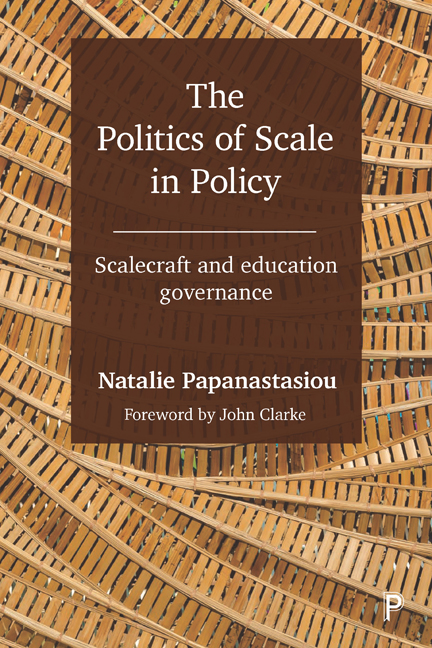Book contents
- Frontmatter
- Contents
- About the author
- Foreword
- Preface and acknowledgements
- 1 Policy, scale and the importance of space
- 2 Problematising scale in the study of policy
- 3 Exposing scale hegemonies
- 4 Knowledge, policy and scale
- 5 Hegemonies of statecraft and scale
- 6 Spatial entrepreneurs and scalecraft
- 7 The practice of scalecraft
- References
- Index
3 - Exposing scale hegemonies
Published online by Cambridge University Press: 27 April 2022
- Frontmatter
- Contents
- About the author
- Foreword
- Preface and acknowledgements
- 1 Policy, scale and the importance of space
- 2 Problematising scale in the study of policy
- 3 Exposing scale hegemonies
- 4 Knowledge, policy and scale
- 5 Hegemonies of statecraft and scale
- 6 Spatial entrepreneurs and scalecraft
- 7 The practice of scalecraft
- References
- Index
Summary
The focus of this chapter is twofold. First, it aims to present an introductory discussion to the book's empirical focus on education governance and policy. By doing so, it aims to demonstrate that education governance is a field that is teeming with politics of scale and therefore constitutes an ideal focus for exploring the book's overarching conceptual puzzle. The discussion briefly reviews the key concepts used by education policy scholars in their study of education governance dynamics, and illustrates how scale features in current analyses of education governance. By identifying how scale remains largely neglected in conceptualisations of education governance, the discussion clarifies the important contribution a critical approach to scale stands to make in this area of study.
The second part of the chapter aims to present a useful entry point for policy scholars seeking to explore possible practices of scalecraft in policy contexts. It does so by outlining the key tenets of a genealogical perspective which draws on political discourse theory and pays particular analytical attention to the ‘dislocatory moments’ of policy. By focusing on the case of the evolution of European education policy, the discussion empirically illustrates how a genealogical perspective is an invaluable lens for exposing the contingency of scale hegemonies and that this serves as an essential starting point for problematising scalar politics.
Education governance and politics of scale
There is little doubt that ‘governance’ has become a ubiquitous term in political science and public administration that has been associated with an ever-increasing number of meanings and conceptual frameworks (Bevir, 2012). Discussions about governance have now gone well beyond the simplistic description of the ‘government to governance’ shift, and now include nuanced characterisations of the processes, institutions and actors involved in the shaping of policy and polity (Sørensen and Torfing, 2018). By drawing on the expansive and diverse governance literature, education policy scholars have also been active participants in developing multiple and wide-ranging approaches and concepts for studying governance in the field of education (see Wilkins and Olmedo, 2018). While it is outside the realm of the chapter to provide an exhaustive review of the education governance literature, it instead focuses on what are among the three most popular concepts used to study ‘education governance’. These are: heterarchical governance, governing at a distance and metagovernance.
- Type
- Chapter
- Information
- The Politics of Scale in PolicyScalecraft and Education Governance, pp. 35 - 46Publisher: Bristol University PressPrint publication year: 2019



